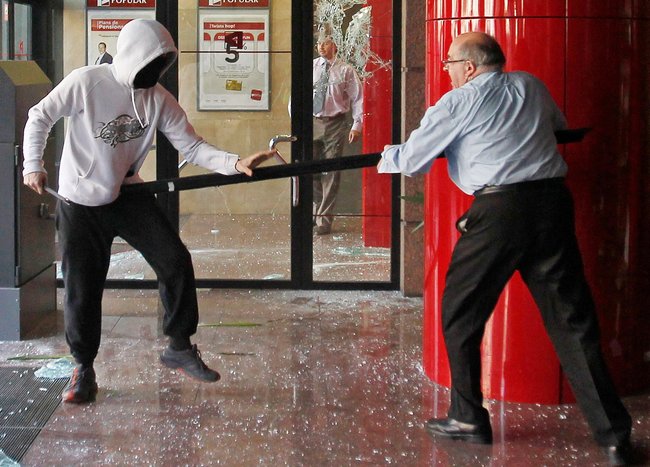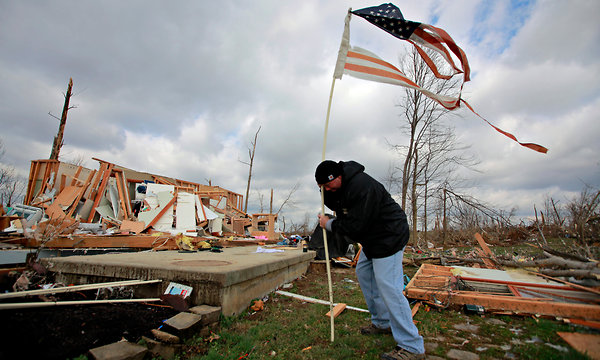I joked about this photo when I first it, perhaps because my wife showed it to me. “I sure feel sorry for that kid. Picking a fight with a middle-aged man, what was he thinking?”
But the truth is, it really is a mismatch in just that way. Even if you notice the shiv in the protestor’s hand, the odds are against him. If caught, he’ll be charged with breaking and entering, assault, mayhem, you name it. If he gets away, it’s just to return to the austerity, vanishing opportunities, and grim future being forced on Spain by the European bankers’ neoliberal policies. As for the fight itself, frankly, the guy on the right has the bigger weapon, good heft, and no fear, and he’s aggressively going for the gut or lower yet.
Just what you’d expect from a banker, come to think of it. Like once sound economies around the globe, Spain is in trouble because of unchecked greed and recklessness by big banks and other financial institutions–a binge of aggressive mismanagement that was promoted by the same neoliberal ideology that now justifies transferring all of the losses downward. Sure, there’s more to the story and each country is different, but as Cassandra–that is, Paul Krugman–has been warning for a long time now, there is no sound economic analysis that justifies the austerity policies being enforced in Europe and trumpted by Republicans in the US. The bottom line is that many who did nothing wrong are being sacrificed to protect an elite that behaved very badly. In Spain, students were demonstrating because the heat was being cut off in their classrooms, and you can bet that isn’t happening on the 45th floor.
If you take a better look at what is happening on the ground, you can see more of the texture of the political situation. The bank lobby is a scene of conflict–but the demonstrators will get no farther than that. The shattered glass suggests that the opulent decor is at least superficially vulnerable, but look at how casually the other banker walks through the mayhem: chaos at the edges is just business as usual, another day in the life of creative destruction. And however lithe the masked demonstrator might be, his clothes aren’t worth the cost of a tie worn by anyone on the other side. Draconian policies push the masses to confront the elite, but that’s a rigged game from the start. And at the finish, if democratic government doesn’t do its job.
Which is how we get to this photo of another pole in a very different place.
A man strains to raise a flagpole in Crittenden, Kentucky, after the devastating storm that swept through the town last Saturday. Perhaps the photo alludes to Joe Rosenthal’s iconic image of the flag raising on Iwo Jima. If so, both the similarities to and differences from the original photograph are notable. On the one hand, a common man labors to plant the national symbol amidst devastation, which suggests that he and his fellow citizens have the same patriotism, determination, willingness to sacrifice for the common good, and similar virtues of those that won the battle at Iwo. On the other hand, times may have changed: the flag is shredded, the pole is bent and spindly, he is all alone, and now even the wind is blowing against him.
Families, friends, and neighbors are pulling together in the heartland, God bless ’em, and they have to. As you look through the slideshows on the storm’s aftermath, it becomes clear that these are people who already had been abandoned to economic decline. Unlike the banker in the the photograph above, for this guy there are few resources at hand, no powerful corporations, connections in high places, or governments that believe in putting your priorities first, last, and always. Republican governors will call for disaster aid, but try get them to invest in the jobs, education, health care, social services, environmental protection, financial regulation, and other public goods that these people need to live reasonably secure lives. So it is that a storm has been blowing across the nation for years, wreaking the lives of ordinary people.
Two photographs, both of disasters in the making, neither of which has anything to do with the weather. The are united by an element of visual composition, but otherwise you might say they are poles apart.
Photographs by Albert Gea/Reuters and Liz Dufour/The Cincinnati Enquirer.


Poles Apart; News item:
Poland wants the U.S. Holocaust Museum in Washington to return a section of barrack that was part of the barrack at the Auschwitz-Birkenau.
http://www.efn.org/~hkrieger/polesapart.jpg